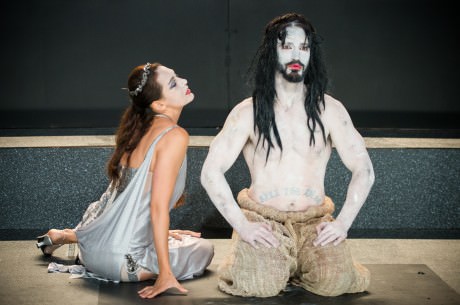There’s some wondrous strange stuff in the Bible, but for out and out bizarro it’s hard to top the tale of the king Herod’s pervy thing for his stepdaughter (Salomé) and his macabre beheading (upon her whim) of an itinerant prophet (John the Baptist). Watching Scena Theatre‘s wondrous strange rendering of Oscar Wilde’s wondrous strange retelling of that age-old tale is to behold a marvel of theatrical imagination and a modern fantasia on aberrant sex.

The coruscating conception of the director and design team was to set Wilde’s 1891 one-act in 1920′s café society, with all the characters in blingy gowns and bespoke dinner duds except John the Baptist, who, imprisoned and stripped to the waist in ashes and sackcloth, seems by contrast a wild savage. In the Bible, and in Wilde, this caged noble savage is the story’s moral compass. Whilst the upper-crusties titter, dish, and connive to a vanity fare-thee-well (and Herod can be seen to be badly in need of a 12-step program for concupiscence addiction), the prophet Iokanaan (as John the B is named in the play) rails against their abominations and exhorts devotion to his crony the Christ. One big surprise of this setup is that it turns Wilde’s symbol-laden poetic diction into glittering bon mots—such that the show tickles with the fun of the society send-ups for which Wilde is renowned.

There’s much that doesn’t make sense about the story (as recorded in Matthew and Mark), like: What’s it doing shoehorned in to an affecting narrative about Jesus’ early ministry? Really, it’s just spliced in, as if the early manuscript copyists needed a quickie to relieve, um, their carpal tunnel syndrome. And another thing: Why is its portrayal of John the Baptist so out of character? Everywhere else the guy is all about preaching to commoners, preparing the way for the Lord, passing on to them the big H20 blessing. But in the interlude where he loses his head, he has unaccountably landed in court in a lather about royals’ marital mishigas—to wit: Herod has wedded Salomé’s mother, Herodias, the wife of his late bro, whom Herod had offed—and in those days that wasn’t kosher. (It’s the part about marrying Herodias that in the biblical episode PO’s the prophet. He denounces the incestuous marriage but remarks not on Herod’s fratricide and incestuous desires for Salomé. So again: Why does this prophet’s character suddenly ring so false?)
If the scandalous/lecherous/nonsensical gorefest that is the Herod/Salomé/Herodias tale were pitched to a Hollywood producer, you might think it would be deemed the hot mess it is. But you’d be wrong. It’s been made into multiple movies.
Little wonder, then, that this very very raw material would have appealed to Oscar Wilde. But what he did with it—and what Scena’s inspired staging and cast have brought entrancingly to life—was to transform the story so that its undercurrent of sexual obsession is not only front and center but refracted into a fascinating threesie: male on male, male on female, and female on male.

We begin with a young man’s infatuation for a fellow fey functionary in Herod’s court. The desired youth, however, has eyes only for Salomé. And it doesn’t get better. Realizing Salomé has eyes only for the buff Iokanaan, the adored lad stabs himself to death. Just like that: unrequited and impaled. We move on to Herod, and his persistent leering at lithe Salomé despite Herodias’ nagging him to keep his eyeballs off her daughter. Salomé, with much moxie, rebuffs the letch. But here’s the really wild twist: Wilde has Salomé have the hots for the prophet, that unwashed hunk with unruly hair whom her stepdad consigned to a cistern for insulting his harridan wife. And to top that off, Wilde has the prophet let loose a river of revulsion for Salomé, which in Wilde’s version turns Salomé’s thoughts to murderous payback. And she’s got a fair point. Iokanaan’ full-throated, full-throttle screeds blaming women for all evil in many ways presage misogynist men’s-rights rants today.
Note to Oscar: D’ya think ya might be workin’ out some personal stuff here? Just askin’. When you wrote this you were headed soon to prison for your dalliance with boy jail bait. You mighta had a lotta anger issues. And sexual conflicts, being on the downlow and all. But ya know, Oscar, it’s prob’ly okay. You’re dead and gone now. You surely paid your dues, dude. And you left behind this edgy, witty, comic and darkly provocative play, one that could not be produced in England in your lifetime because it was banned, but one with which an adventurous, 25-year-old, crazy-young-at-heart theater company in Washington, DC, could one day concoct a mind-blowing delight.
Running Time: One hour and 45 minutes, with no intermission.
Salomé plays through August 18, 2013 at the Atlas Performing Arts Center – 1333 H Street, NE, in Washington, DC. For tickets, purchase them online.
LINK
Derek Mong reviews Salomé on DCMetroTheaterArts.




